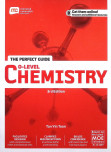We use cookies to make your experience better. To comply with the new e-Privacy directive, we need to ask for your consent to set the cookies. Learn more.
Science Matters comes from Marshall Cavendish Education and is intended for the high school crowd. This series covers three branches of science: biology, chemistry, and physics. Like other products from this publisher, there are several different components.
The Teacher Planning Guide contains an overview of the curriculum and an outline of the resources and activities available. Lesson plans are offered for each chapter with a suggested number of periods for covering each one. Each lesson lists learning outcomes, prior expected knowledge, and concepts for those lessons. This is written for classroom use, so some adaptation might be necessary. Full solutions to the textbook questions are also included.
The softcover Textbook for each subject is in full color. Books are divided into themes or topics and then divided into 22 chapters (24 in chemistry). Each chapter begins with several questions and wraps up with real life application of the chapter content, key ideas, quiz questions and review questions. Along with textual information, the text includes instructions for hands-on investigations, example problems with detailed solutions and notes for where to insert workbook assignments and prompts to try to answer the opening questions.
The Workbook complements the textual information by providing worksheets that include multiple-choice, structured, and free-response questions. Questions are at different difficulty levels. The Workbook Teacher Edition includes the student pages with answers filled in.
The Practical Book is the lab manual for each course and contains all of the experiments to enhance the lessons of the program. Practicals (or experiments) are designed to help students develop good lab skills and scientific methodology. This book is designed for a school setting and uses some lab equipment that may not be readily available to homeschool families. It is even suggested that some of the labs be carried out only in a science laboratory setting. Homeschool families and smaller schools with limited budgets can still use this book but will need to adapt or omit some of the labs. The course is completely doable without using this book. The Practical Teacher Edition includes the same pages as the student Practical Book with answers filled in.
There are no test books specifically written for this series, so parents will need to choose alternative assessment options or use material from either the Perfect Guides or Structured Questions books. Perfect Guides were designed for students in Singapore taking the "O" level exams for these courses, so they function as a sort of a study guide. Perfect Guides contain study notes, learning objectives, common errors, glossaries, questions with solutions and explanations, and tests with both structured and multiple-choice questions. There are four review tests and two final exam trial tests (with answers in the back). Topics are the same as the corresponding textbook but the order varies a bit between the Perfect Guide and the text. Structured Questions are another source of assessment material, with fill-in-the-blank, matching, short answer, and challenge questions for each text. Answers are provided at the back. Biology and Physics Structured questions guides correspond with the texts. Chemistry shows different chapter headings although the sequence of actual topics is the same.
If you like the science courses for younger grades from this publisher like My Pals Are Here or Interactive Science this could be a good choice for your high school students. The information is clearly written and easy to understand, and all measure is metric.





























